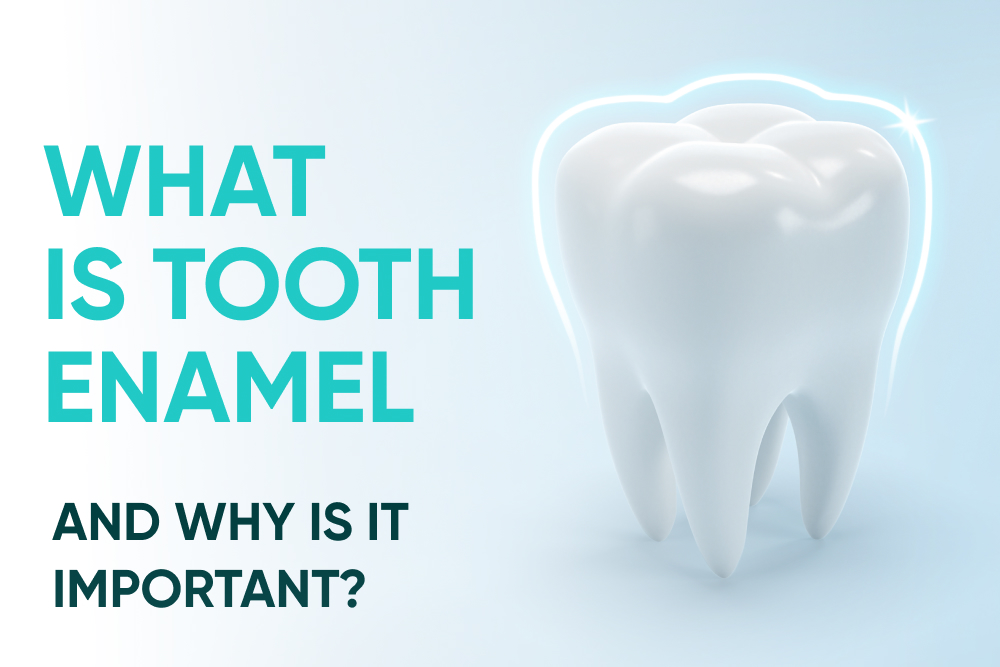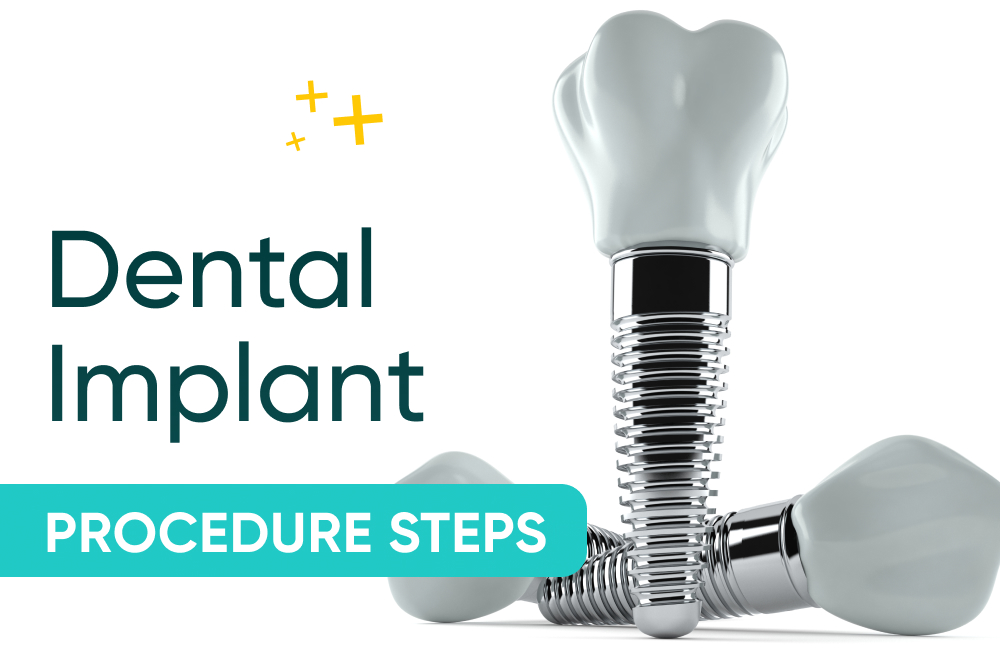Your smile is one of your most valuable assets, and tooth enamel plays a vital role in keeping it bright and healthy. As the outermost layer of your teeth, enamel acts as a shield against bacteria. It also protects your teeth against acids and other harmful substances that can lead to decay and cavities. But what is tooth enamel exactly? In this post, we’ll discuss its functions and the proper care you need to follow.
Let’s explore tooth enamel in more detail to understand why it is so important.
What is the enamel of a tooth?
Tooth enamel is a hard, protective covering made up mainly of minerals like calcium and phosphate. In fact, it is the hardest substance in the human body. Overall, the composition of tooth enamel gives it its strength and durability.
Moreover, enamel forms during childhood when teeth are still developing. But once fully formed, it cannot be regenerated or repaired by the body. This makes preserving existing tooth enamel essential for maintaining optimal dental health throughout your life.
Aside from that, your tooth enamel is the thing that keeps your teeth white. This means damaged or worn tooth enamel will directly affect the appearance of your teeth.
Important functions of tooth enamel
Tooth enamel performs several vital functions to maintain dental health, including keeping your attractive smile. To give you an idea, here are some of the key functions of tooth enamel that will encourage you to keep it healthy:
1. Protection
One of the primary functions of tooth enamel is to protect the underlying layers of teeth from damage caused by bacteria and acids present in food items. Moreover, enamel acts as a shield against these harmful substances by providing a hard barrier. This barrier prevents harmful substances from reaching the sensitive dentin underneath.
What’s dentin, you ask? It’s the bonelike substance beneath the tooth enamel. If exposed or contaminated, your dentin can trigger pain or sensitivity when consuming hot, cold, acidic, or sugar food items.
When you get damaged tooth enamel, bacteria can penetrate through it easily. This can lead to tooth decay and cavities if not addressed promptly.
2. Sensitivity Reduction
As mentioned, tooth enamel is essential in reducing sensitivity by protecting the underlying dentin.
Dentin contains microscopic tubules that connect to nerve endings inside the teeth. When these tubules are exposed due to thinning tooth enamel, hot, cold, or sweet stimuli can cause discomfort.
Take note that the most common causes of sensitivity are tooth grinding, acidic food, gum recession, and weak tooth enamel.
With this, taking steps to preserve your enamel can significantly reduce tooth sensitivity and improve overall comfort. It will also save you from dealing with unbearable tooth pain.
3. Bite Force Distribution
Healthy enamel ensures that the force generated during biting and chewing is evenly distributed across your teeth.
In contrast, erosion or a dent in tooth enamel can lead to an imbalance in bite functionality. Also, the uneven distribution of forces may result in excessive wear on specific teeth or even jaw discomfort.
By maintaining strong and intact enamel, you are promoting proper alignment and function of your bite. This contributes to your overall oral health.
4. Aesthetic Appeal
Aside from its functional roles, tooth enamel also plays a significant part in the aesthetic appeal of your smile. Having strong and well-maintained enamel contributes to the good appearance of your teeth.
However, several factors can stain or damage enamel over time. Consuming foods and drinks such as coffee, tea, and red wine can lead to discoloration if not properly managed.
Additionally, habits like smoking or tobacco use can also have detrimental effects on the appearance of your teeth. Over time, these vices will alter your teeth, ultimately leading to damaged and cracked tooth enamel.
5. Maintenance of tooth structure
Did you know that chipped tooth enamel can significantly impact your tooth structure? It’s because damaged tooth enamel exposes your teeth to further structural damage. If not managed, your teeth will look uneven, which will require intensive dental work like a root canal.
What happens if tooth enamel is gone?
If tooth enamel is completely worn away or gone, it can have several negative consequences for your dental health. Here are some potential outcomes of enamel loss:
- Increased Sensitivity. Without the protective layer of enamel, the underlying layer called dentin becomes exposed. When hot, cold, sweet, or acidic substances come into contact with these nerves, it can cause heightened sensitivity and discomfort.
- Yellowing and Discoloration. When enamel is gone or severely eroded, the yellowish dentin underneath becomes more visible. This can result in a noticeable change in the color and appearance of your teeth.
- Tooth Decay and Cavities. Enamel acts as a barrier between harmful bacteria and the softer layers of the teeth. If you have a tooth with no enamel, bacteria can penetrate deeper into the tooth structure, leading to cavities.
- Weakened Tooth Structure. Thin tooth enamel can weaken the overall structure of your teeth. It will become more susceptible to cracks, chips, or fractures even from normal biting forces.
- Increased Risk of Dental Infections. As bacteria penetrate deeper into the tooth without enamel, there is an increased risk of dental infections such as abscesses. These infections can lead to severe pain and may require extensive dental treatment to address.
- Accelerated Wear on Teeth. Without enamel, your teeth may experience faster wear and tear due to friction during chewing and other normal daily activities. This can result in shorter tooth lengths and uneven tooth surfaces.
What causes tooth enamel loss?
Enamel loss can be due to a variety of reasons, including the following:
- Poor Oral Hygiene. Inadequate oral hygiene practices can lead to the buildup of plaque on the teeth. Unfortunately, plaque produces acids when they come into contact with sugars from food and drinks. These acids attack the enamel, causing erosion and eventual enamel loss if not properly removed through brushing and flossing.
- Tooth Grinding (Bruxism). People who grind or clench their teeth during sleep or due to stress can experience excessive force on their teeth. This repetitive pressure can cause gradual wear and tear on the enamel, leading to enamel loss over time.
- Excessive Brushing. You read it right. When you brush on tooth enamel too hard, it can lead to damage. Overall, brushing your teeth too aggressively or using a hard-bristle toothbrush can do more harm than good.
- Genetic Factors. In some cases, individuals may be more prone to enamel erosion due to genetic factors. This directly affects the mineralization and quality of their tooth enamel.
Does tooth enamel grow back?
Can tooth enamel grow back? Unfortunately, no. There’s no turning back once your tooth’s enamel is damaged or lost.
Still, dentists can help improve the mineral content of weakened enamel to slow down further damage. They typically use fluoride treatments and recommend dental products with minerals that help protect the tooth’s surface.
So which mineral strengthens and repairs tooth enamel? Calcium is the answer. This mineral helps harden soft tooth enamel to stop further damage.
But then again, you can’t grow back tooth enamel. This is why prevention is always crucial when it comes to dental care.
Caring for Tooth Enamel
You shouldn’t wait for cracks in tooth enamel before you take action. These simple tips below can help protect your tooth from further or future damage.
1. Proper oral hygiene
Maintaining good oral hygiene practices is crucial for protecting tooth enamel from plaque buildup. Regular brushing with fluoride toothpaste helps remove plaque while strengthening the protective layer of your teeth.
Also, don’t forget the importance of flossing daily. Floss reaches places that brushing alone cannot access effectively. It also removes plaque between teeth to prevent decay. Aside from that, it maintains healthy gums – essential for supporting strong tooth enamel.
2. Balanced Diet
A balanced diet plays a key role in maintaining healthy teeth and supporting remineralization of tooth enamel. Overall, calcium-rich foods such as dairy products, leafy greens, and almonds are beneficial for your dental health. Incorporating these foods into your diet will provide the necessary minerals needed to keep your enamel strong.
On the other hand, take note certain foods and drinks can weaken or erode enamel. Sugary drinks, like soda or fruit juices, create an acidic environment that can break down enamel over time.
With this, limiting the consumption of these harmful substances is crucial for maintaining optimal dental health.
3. Avoidance of harmful habits
Certain habits can damage tooth enamel or accelerate its erosion. Teeth grinding (bruxism) and nail-biting are some common examples of this. Also, using teeth as tools to open packages or chew on hard objects can also cause enamel wear and tear.
If you have any of these habits, consider finding ways to address them or seek professional help.
4. Regular Dental Check-ups
Regular visits to your dentist are essential for maintaining healthy tooth enamel. General dentists can perform professional cleanings that remove plaque and tartar buildup that cannot be achieved through regular brushing alone. They also examine your teeth thoroughly, looking for signs of enamel erosion or decay.
Overall, early detection of enamel problems allows for timely intervention such as fluoride treatments or dental sealants. By staying proactive with routine dental check-ups, you can address potential problems before they become more severe.
Conclusion
Tooth enamel is a critical component of dental health and it contributes to an attractive smile. By prioritizing proper oral hygiene practices and adopting good habits, you can ensure the longevity of your tooth enamel.
Remember that prevention is key when it comes to preserving tooth enamel. Taking care of your teeth now will save you from potential oral health complications down the road.
Above all, make it a habit to go to routine dental checks twice a year. Experts like NoHo Family Dental are always here to care not just for your tooth enamel, but also your entire dental health.




